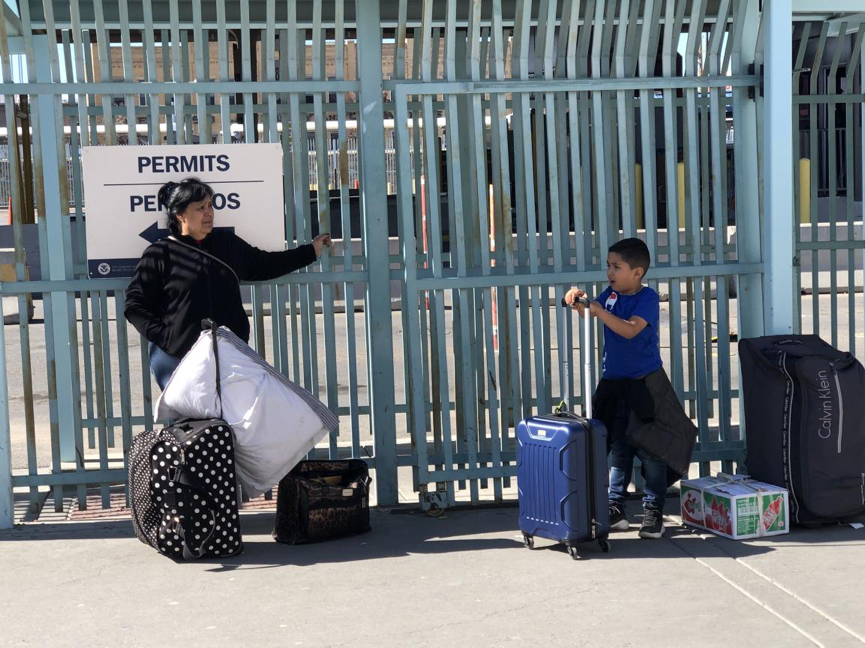
By Zhang Mengxu
The United States has taken tougher policies and measures to enforce the law on migrants in the past two years, triggering bouts of international criticism.
I have recently revisited El Paso, a major border city in the southern U.S., to write an article on the status quo of illegal immigrant children. This was the third time that I had visited the U.S.-Mexico border in about one year.
I first came to the U.S.-Mexico border in June 2018, when the U.S. government reached its peak in cracking down on illegal immigration and carrying out the “zero tolerance” policy.
The infamous child detention center is located in the Tornillo Port near El Paso, Texas and the temperature there could reach as high as over 40 degrees Celsius in summer.
Undocumented immigrant minors, from several-month-old babies to teenagers, had just been separated from their parents by the U.S. officers and sent to the tents in the center to wait and find out their fate while suffering from the high heat.
The U.S. prides itself on freedom of the press, but no sooner had my partner and I taken a few pictures outside the camp’s barbed wire than the U.S. officers stopped us, checked our IDs and escorted us out of the camp.
In February of this year, the U.S. government declared a national emergency along the southern border in an attempt to circumvent the House of Representatives and secure enough funding to build a wall on the U.S.-Mexico border.
When I interviewed the local people in McAllen, a city along the U.S.-Mexico border, I found that most people think that it was nonsense to say that the southern border was faced with a security crisis. People who live in the peaceful city couldn’t understand why the government tried to demonize illegal migrants.
The U.S. is a nation of immigrants and more than two-thirds of the residents in McAllen are first- or second-generation immigrants, said an immigration lawyer in McAllen, adding that the evidence of the government has against illegal immigrants is by no means valid and is merely an excuse for political purposes.
Recent data from the U.S. Department of Health and Human Services suggest that an unprecedented amount of 69,550 unaccompanied migrant children were held in U.S. government custody between October 1, 2018 and September 30, 2019. So I once again came back to El Paso to dig more about the tragedy.
Americans are said to care for their own children, yet how come they treat the illegal migrant children as prisoners? Not to mention that during the period, seven immigrant children died when held in U.S. government custody.
The U.S. has always claimed itself to be a defender of human rights, but what it has done doesn’t quite agree with what it has said.
Many advocates for immigrant rights in McAllen criticized the government’s heavy-handed approach by saying that the data has put a moral stain on America, shamed the country and showed the world a U.S with no values.
The historical museum of El Paso, a frontier city that has thrived because of immigrants, has recorded the landmarks in its development since it became part of the U.S. in 1850.
In the second half of the 19th century, thousands of Mexican farmers would cross the border every day to toil on the American side of the border, promoting the prosperity of local agriculture. Later around the early 20th century, the completion of the railroad in the south of America started to make El Paso a boomtown along the border.
Today El Paso becomes a symbol of immigrant culture, with 83 percent of the city’s 680,000 people are from Latin America. Every year, about 10 million people cross through El Paso into the U.S. from Mexico.
Immigration is a profound reflection of America’s current political predicament, according to Martha Menchaca, professor from the Department of Anthropology at the University of Texas at Austin.
The U.S. faces a series of challenges concerning governance, such as drugs, public security, the gap between the rich and the poor, said Menchaca.
She thinks that every time the U.S. politicians couldn’t solve these problems once and for all, they would play the card of illegal immigrants and turn their guns on the most vulnerable migrants.
As is seen already, the U.S. has repeatedly withdrawn from international conventions and the current American political climate is clouded by isolationism, racism and extremism.
The U.S. is marching towards a path far different from the one that it wanted to tread when it was founded, as pointed out by many insightful people.
Is the U.S. still the same as it was? That’s a question many Americans should be asking themselves. For many people, openness, diversity and inclusiveness were once the name cards of America.
Today, however, the mass incarceration of illegal immigrants, the inhumane treatment of migrant children, the arbitrary adoption or abandonment of international rules seem to have become the new labels of America.
